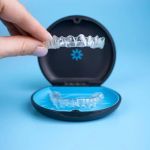How to Handle a Knocked-Out Tooth: Immediate Steps to Save Your Smile
Accidents happen. Whether it’s a sports injury, a fall, or an unexpected collision, one of the most terrifying moments is realizing that your tooth has been knocked out. I can still remember the moment when my friend, Tom, lost his tooth during a friendly game of basketball. His face was filled with panic, and as he stared at the tooth lying on the floor, I could see the fear in his eyes. But what we didn’t know then was how crucial those first few minutes were to saving his tooth. In this article, I’m going to walk you through the exact steps you need to take if you ever find yourself in a situation where a tooth is knocked out, and how to increase your chances of getting it successfully reattached.
One thing I’ve learned over the years is that handling a knocked-out tooth quickly and correctly can make all the difference. Whether you’re dealing with a permanent adult tooth or a baby tooth, the immediate actions you take can determine whether the tooth is salvageable. In this guide, I’ll explain exactly what to do (and what not to do) in the crucial minutes following a tooth injury, so you can act fast and keep your cool during a stressful dental emergency.
1. Understanding the Situation: What Happens When a Tooth Gets Knocked Out?
Before jumping into the steps, it’s important to understand why time is of the essence when a tooth gets knocked out. A tooth is held in place by a structure called the periodontal ligament, which attaches the tooth to the surrounding bone. When a tooth is knocked out, the ligament and other soft tissues may be damaged. The longer the tooth is out of the socket, the more difficult it becomes for the tooth to survive and be reattached. That’s why it’s essential to act as soon as possible—ideally within 30 minutes to an hour of the injury.
In my case, Tom’s tooth was knocked out after a strong, accidental elbow during our basketball game. Fortunately, we acted fast, and the outcome was much better than we had expected. However, I’ve seen other people delay seeking dental help, and unfortunately, those cases didn’t always end well. Time is not your friend when dealing with a knocked-out tooth.
2. What to Do Immediately After Losing a Tooth
So, what should you do in the first few minutes after a tooth gets knocked out? Here are the immediate steps you should follow:
- Stay Calm and Check the Tooth: The first thing you need to do is remain calm. Panic won’t help, and it may cloud your ability to think clearly. Look at the tooth—handle it by the crown (the part that’s usually visible when you smile) and avoid touching the root, which can be delicate and more easily damaged.
- Retrieve the Tooth Safely: If the tooth is on the ground, gently pick it up and inspect it. Be careful not to damage the root further. If the tooth is dirty, rinse it gently with water or saline solution—never scrub it or use soap. If possible, you can place the tooth back in its socket to keep it moist, but do not force it. If you can't get it back in, that’s okay—move on to the next step.
- Keep the Tooth Moist: One of the most important things to remember is that the tooth needs to stay moist. The periodontal ligament will begin to dry out if left exposed to the air, and the chances of saving the tooth drop significantly. If you can, place the tooth in a container with milk, or in a saline solution. If milk isn’t available, the next best option is saliva—if you can’t get the tooth back in the socket, you can hold it between your cheek and gum to keep it moist until you reach a dentist.
- Get to the Dentist Quickly: Time is critical when it comes to reattaching a knocked-out tooth. The faster you get to a dentist, the better the chances of saving the tooth. Call your dentist’s office immediately and let them know it’s an emergency. They may advise you to come straight to the office or give you instructions for handling the situation.
3. What Not to Do: Common Mistakes in a Dental Emergency
In my experience, I’ve seen many people make common mistakes when dealing with a knocked-out tooth. While it’s important to stay calm and act quickly, there are also several things you should avoid to ensure the best possible outcome.
- Don’t Touch the Root: It can be tempting to pick up the tooth by the root, but this can cause irreversible damage. Always handle the tooth by the crown.
- Don’t Use Soap or Scrub the Tooth: Rinsing the tooth with water or saline is fine, but never use soap or any other chemicals. Scrubbing the tooth can also damage the delicate cells needed for reattachment.
- Don’t Let the Tooth Dry Out: It’s absolutely essential that the tooth remains moist. Never place the tooth in dry tissue, napkins, or any other material that can cause it to dry out.
- Don’t Delay Seeking Professional Help: Time is of the essence, and delays can severely reduce the chances of saving the tooth. Even if you're unsure if the tooth can be reattached, it’s always better to see a dentist immediately.
4. Can the Tooth Be Saved? What Happens at the Dentist?
When you get to the dentist, they’ll assess the situation and determine whether the tooth can be reattached. There are several factors that will influence the outcome, such as how long the tooth was out of the socket and how much damage the tooth and its surrounding tissues have sustained.
If the tooth can be saved, your dentist will likely try to reinsert it into its socket and secure it with a splint to allow it to heal in place. In some cases, the tooth may need to be treated with a root canal procedure to ensure its survival. Your dentist may also provide antibiotics to prevent infection and prescribe pain relief.
In situations where the tooth cannot be saved, your dentist will discuss options such as dental implants, bridges, or dentures as replacements.
5. Preventing Tooth Loss in the Future: Tips and Protection
While it’s impossible to completely eliminate the risk of a knocked-out tooth, there are several measures you can take to reduce the chances of it happening again. If you play sports or engage in activities where falls or impacts are common, wearing a mouthguard can help protect your teeth from injury. I’ve used mouthguards during sports for years, and they’ve definitely saved me from a few close calls!
In addition to wearing a mouthguard, it’s also a good idea to regularly visit your dentist for check-ups. Maintaining healthy teeth and gums can help reduce the risk of other dental problems that could make your teeth more vulnerable to injury.
6. The Importance of Dental Care and Seeking Immediate Help
Experiencing a knocked-out tooth can be incredibly stressful, but knowing how to handle the situation can make a huge difference. In my own experience, the most important thing is to remain calm, act quickly, and get to a dental professional as soon as possible. The earlier you seek help, the better your chances are of saving the tooth.
If you find yourself in a situation like this, remember that veterinary care can save your smile. At Dentistry Toothtruth, we offer guidance on how to find the best dental services and professionals to help you in an emergency. Don't hesitate to seek professional dental care in these situations to protect your teeth and overall dental health!







 Bindi Patel D.D.S4.0 (77 review)
Bindi Patel D.D.S4.0 (77 review) Marshall H Titus, DDS0.0 (0 review)
Marshall H Titus, DDS0.0 (0 review) Smiles of Elgin4.0 (46 review)
Smiles of Elgin4.0 (46 review) Yonkers Dental Implants Center4.0 (63 review)
Yonkers Dental Implants Center4.0 (63 review) Dr. Tom Family & Cosmetic Dentistry4.0 (272 review)
Dr. Tom Family & Cosmetic Dentistry4.0 (272 review) Smooth Dental and Orthodontics4.0 (371 review)
Smooth Dental and Orthodontics4.0 (371 review) The Importance of Oral Health Education During Pregnancy for a Healthy Pregnancy
The Importance of Oral Health Education During Pregnancy for a Healthy Pregnancy Best Tips for Brushing Your Teeth Properly for Healthy Gums: Essential Techniques for Oral Health
Best Tips for Brushing Your Teeth Properly for Healthy Gums: Essential Techniques for Oral Health Why Skipping Dental Checkups Can Lead to Bigger Oral Health Problems
Why Skipping Dental Checkups Can Lead to Bigger Oral Health Problems Advantages of Porcelain Dental Restorations
Advantages of Porcelain Dental Restorations How Can Diabetes Cause Tooth and Gum Problems? Preventing and Managing Oral Health Issues
How Can Diabetes Cause Tooth and Gum Problems? Preventing and Managing Oral Health Issues Healthy Habits for Promoting Good Oral Health and Hygiene: Tips for a Healthy Smile
Healthy Habits for Promoting Good Oral Health and Hygiene: Tips for a Healthy Smile